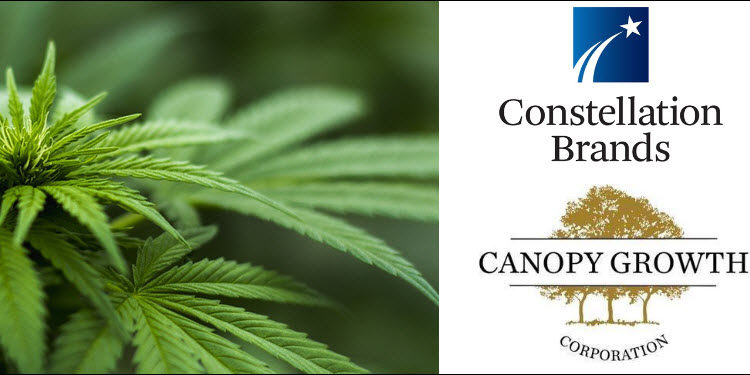
Constellation Brands, an American beverage company responsible for the production of beverages like Corona and Modelo, has been slowly entering the cannabis space with their acquisition of Canadian cannabis brands.
CEOs Rich and Rob Sands are trying to break into the cannabis market by investing in Canada cannabis company, Canopy Growth (CGC). Alongside their popular beverages, they aim to roll out a CBD and THC-infused beverage called Quatreau throughout the U.S.
Constellation Brands — a Brief History
Constellation Brands is one of the leading companies in alcohol distribution. They are an international producer of beer, wine, and spirits. Some of their most recognizable drinks are Corona, Modelo, and SVEDKA Vodka. Now, Constellation Brands is in the cannabis industry.
Previously remembered as Canandaigua Wine Company, their origins date back to 1945. Founder Marvin Sands started a small winery in Upstate New York, according to the Constellation Brands website. The company sold only wine at first, but soon became iconic for their other liquors.
As of April 2021, they have a net worth of $46.2 billion, reports MacroTrend, a finance solutions company.
Partnering with CGC would see their business alongside Seth Rogen’s Houseplant, Martha Stewart, and Tweed.
Buying Into Canopy Growth (CGC)
CGC is Constellation Brands’ shortcut into cannabis.
According to The Motley Fool, a financial news publication focused on stocks and investments, Constellation Brands owns 38.6% of CGC’s market shares. That’s a $4 billion stake in the company.
CGC has endured extreme financial problems in the past year. But Constellation Brands is keeping their investments in CGC since it has an established audience in the cannabis market.
In a press release, CGC announced a $1.3 billion loss in their 2020 fourth fiscal quarter. Due to the coronavirus pandemic, and Canada’s strict lockdowns in March 2020, more than 20 retail locations closed indefinitely. The loss for that quarter grew because of it.
The expense of restructuring also adds to these losses. MjBizDaily reports that CGC’s rollout of new cannabis products represented only 2% of their fourth quarter sales. A costly ambition to release these products without much revenue led to irreversible losses.
CGC cut around 500 jobs and shut down two cultivation farms, further downsizing in an effort to extend the lifespan of the company.
CGC outlined the future of the company, saying that, “the company no longer strives to be the first to every market, but strives to [be] the best and become a leading consumer insights and product development company in select priority markets, that matches products and consumer preferences in the cannabis space.”
Moving forward, 2021 is their transition year. They plan to focus more on consumer needs rather than solely on their business side.
The CGC and Acreage Holdings Deal- What it Means For Constellation Brands
CGC is currently planning to acquire Acreage Holdings. From cultivating cannabis to setting up retail stores across the country, Acreage Holdings is a major multi-state cannabis operator across the U.S.
Once CGC incorporates Acreage into its business, Constellation Brands would have an automatic investment in Acreage’s U.S. market. Ultimately, this transaction would put Constellation Brands’ $4 billion deal to good use, since it gives the company access to an international cannabis-infused drinks market.
Acreage outlines their excitement for the CGC deal, saying that it sets “the stage for a combined global cannabis powerhouse once it’s federally permissible for Canopy to acquire our company.”
This deal seems almost necessary after the extreme losses Acreage Holdings faced in 2020. According to Green Market Report, Acreage was too ambitious in their expansion efforts. They expanded too quickly, eventually losing capital because the rollout was not as lucrative as once expected.
Acreage Holdings’ former CEO, Kevin Murphy, commented on the loss, saying that:
“The impact of the COVID-19 pandemic on U.S. cannabis operators has been profound, at a time when the industry was already reeling from decreased access to capital, legislative uncertainty, and the illicit-market vaping crisis that struck our industry by association. Led by a nimble operating team and Board of Directors that has proven its ability time and again to adapt and thrive in challenging times, we are supremely confident our plan will ensure operational profitability and excellence and position us to deliver improved shareholder returns in short order.”
Is This Loss Worth it?
The CGC and Acreage Holdings could be looked at with the best interests of the ever-changing cannabis market in mind. Cannabis businesses are extremely volatile, especially when constant overcorrection of the cannabis market risks the valuations of its stocks. Stocks rise and fall quickly, creating risk for industry investors.
Ultimately, Constellation Brands can withstand these financial losses. They can sacrifice a small portion of their capital as long as there is an already-established infrastructure with international recognition.
Constellation Brands needed an ‘in’ to the cannabis market, and acquiring a large portion of CGC means they also have partial ownership to Acreage Holdings. It’s worth it for Constellation Brands to remain CGC’s largest investor because it’s an already established business, even considering the financial problems they have faced.



Leave a Reply